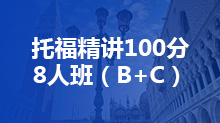
托福阅读材料之高中外号

Princess. Loser. Brain. Prude. Popular. In high school, we all get a label: sometimes, it’s one we spend decades trying to live up to; sometimes it’s one we desperately want to leave behind. The need to separate people into distinct, easy-to-identify groups and classes is one that’s not necessarily confined to anorak the halls of a high school. Still, high school—when kids first try to determine who they’ll be as adults—is where the effect of those labels seem to be most acute and long-lasting. But are they accurate? And how do those labels shape who we become in an age when, thanks to social networks, we don’t really ever leave our adolescent friends behind.
Judging and being judged have always been an unofficial part of the high-school curriculum. Most teens are trying to find out who they are and labels help make distinctions about who they could be, who they’re not, and who they should aspire to be. And those labels have power. “They’re very sensitive to what their peers think of them, in part they’re trying to understand who they are and becoming adults,” says Judy Baer, professor of sociology at Rutgers University. “To fit in is important biologically—we live in groups and we all want to fit in.”
Depending on the size of the school, the labels and roles given to kids can begin well before the teen years. “At small schools, kids can feel by the time they're in fourth grade, [that they] can never get out,” says Roselind Wiseman, a parenting educator and author of Queen Bees and Wannabees. But even in larger schools, it’s hard to escape a label. “By 10th grade, it’s often pretty set,” she says.
But after high school, whether or not kids are defined by the labels that branded them very much depends on how rigidly that kid adheres to the same systems of structure and hierarchy found in high school. “If you go from a totally stratified high school to a very stratified college where the Greek system is very, very strong and you are aligned with your fraternity or sorority ... If you go from that to that to your country club, when exactly are you adult, and when are you making decisions about what you want and what does it feel like to be outside of the group?” asks Wiseman.
One important change for this generation is that kids are taking longer to grow up and establish themselves in society as adults. And, while this extended adolescence has been lamented as “failure to launch,” some experts say this long period of “emerging adulthood,” which can last into the late 20s, could make high-school labels less potent. “The kind of exploration and identity-defining that used to really predominate in adolescence and in the high-school years has largely kind of shifted up the spectrum now into this emerging adulthood,” says Tim Clydesdale, a professor of sociology at the College of New Jersey. “Emerging adulthood,” then, gives kids a larger window to figure out who they are and how they define themselves, making the high-school labels just the first step in a longer process of self-discovery.

相关文章
热门项目
免费预约试听
- 雅思
- 托福
- A-Level
- 留学
- 考研
- KET/PET
- OSSD
- DSE
- TOEFL Junior
- 多领国
- 小语种
- 锦秋国际
- AP
- GRE/GMAT
- SAT/ACT
- PTE
- 腾飞计划
- 其他
热门活动







